The founders of Twine Studio (繭裹設計) use wool felting, one of the earliest fabric-making techniques, to create contemporary designs.
“We like to use traditional materials and skills, but create new, modern styles,” says Elizabeth Tsai (蔡宜穎), who started Twine Studio with Vinka Yang (楊士翔) while the two were working as architects in Shanghai. The pair moved back to Taiwan last year and opened their Taipei City store in January.
Twine Studio’s store near Zhongshan MRT Station shares a space with Earth Tree (地球樹), which specializes in fair-trade clothing and home accessories. In addition to their own creations, Tsai and Yang also sell fair-trade and eco-friendly products, as well as handmade items by Taiwanese artists.
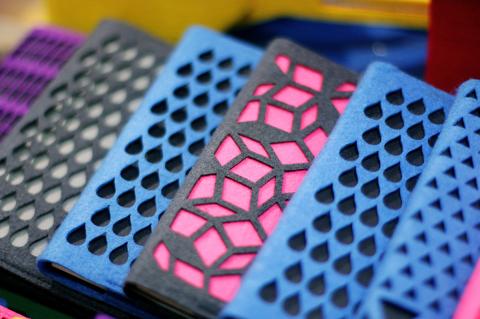
Photo: Catherine Shu, Taipei Times
Twine Studio’s signature design is a pendant made from dried lotus pods grown in Baihe District (白河區), Greater Tainan. A rainbow of felted wools are stuffed into the round, empty eyes of each pod, which are then strung from necklaces braided from shimmery string spun from fibers leftover from the manufacture of sari fabric in India. Other accessories in the Felt Fruit series feature a forest’s worth of dried plants and natural materials: sweetgum tree pods, chestnuts, lemons rinds, sugar apples, even delicate honeycomb. Another series includes chunky bangles and beads sculpted from different shades of gray felt to look like stone.
Twine’s clothing, most of which is sewn by Tsai, includes appliqued T-shirts made from organic cotton and a “travel blouse,” which can be tucked into an attached pouch that closes with a snap.
Urban Yurt, Tsai and Yang’s first collaboration, won them the silver prize at the 2006 Taiwan International Design Competition (台灣國際創意設計大賽). Inspired by origami, the project was conceived as a “shelter for urban nomads” and consisted of a briefcase-sized fabric envelope that could be unfolded into different articles of clothing or a sleeping bag.
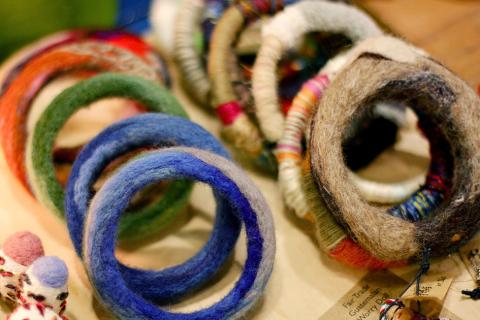
Photo: Catherine Shu, Taipei Times
Two years later, the duo launched Twine Studio, selling their felted jewelry at Cocoon, a small Shanghai store they started with a group of friends. In 2009, Twine Studio participated in that city’s Eco Design Fair (生態環保設計展), which inspired them to begin using environmentally sustainable materials.
After returning to Taiwan, Yang and Tsai opened a tiny store in Greater Taichung, but say they had trouble finding other boutiques to carry their items on consignment and convincing consumers about the value of organic cotton.
“I think a lot of people aren’t sure of the difference between organic cotton and ordinary cotton,” says Tsai. “The texture is a little different, but the most important thing is that ordinary cotton is grown with a lot of pesticide, so organic cotton is not just better for the environment, but for people.”
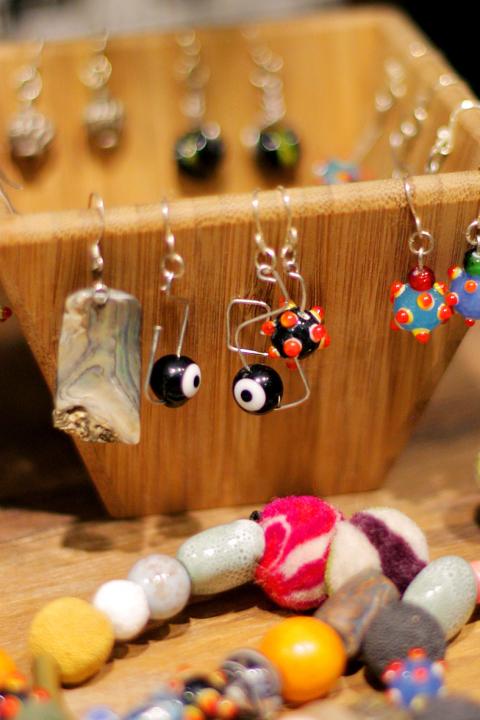
Photo: Catherine Shu, Taipei Times
The two found a supporter in Earth Tree owner Lydia Wang (王靖宜), who began carrying their items before offering them a space in her Taipei City store, to which Twine Studio relocated from Taichung.
The brands Twine Studio import are either certified by the World Fair Trade Organization or made from environmentally friendly materials. Taiwanese indie labels represented include printmaker Chiuzen (沾手) and Bag Up, which sews purses and totes from discarded museum exhibition banners.
Twine carries several of UK fair-trade label Nkuku’s kitchenware lines, including stainless steel four-tier tiffin carriers and jugs painted with highly detailed designs in rich colors by artisans in Kashmir, India.
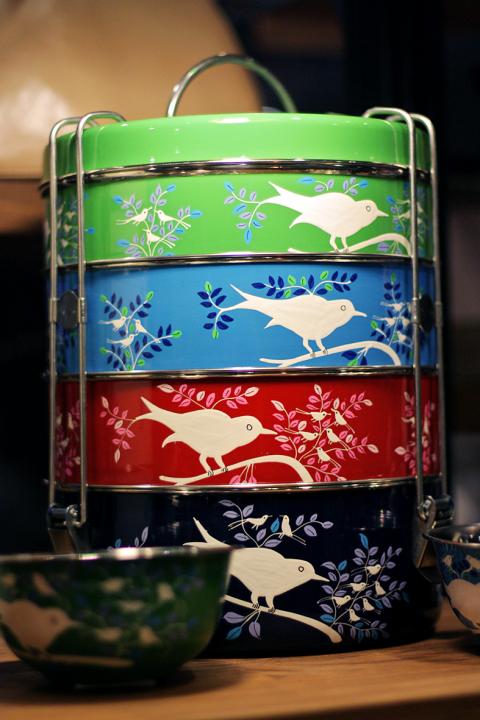
Photo: Catherine Shu, Taipei Times
“We want to focus on handmade things that are eco-friendly, but our goal is also to show that handmade items can be of extremely high quality,” says Yang.

Photos: Catherine Shu, Taipei Times
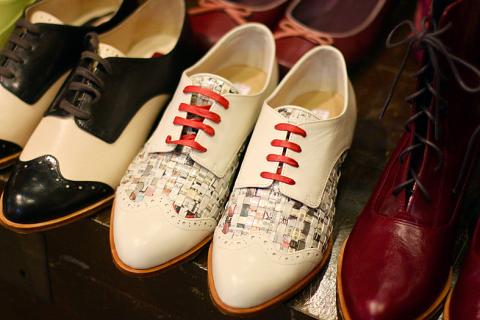
Photo: Catherine Shu, Taipei Times
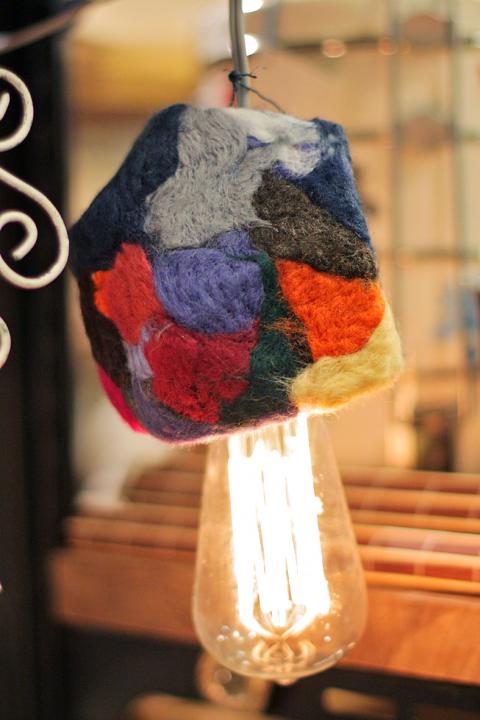
Photo: Catherine Shu, Taipei Times

June 9 to June 15 A photo of two men riding trendy high-wheel Penny-Farthing bicycles past a Qing Dynasty gate aptly captures the essence of Taipei in 1897 — a newly colonized city on the cusp of great change. The Japanese began making significant modifications to the cityscape in 1899, tearing down Qing-era structures, widening boulevards and installing Western-style infrastructure and buildings. The photographer, Minosuke Imamura, only spent a year in Taiwan as a cartographer for the governor-general’s office, but he left behind a treasure trove of 130 images showing life at the onset of Japanese rule, spanning July 1897 to

One of the most important gripes that Taiwanese have about the Democratic Progressive Party (DPP) is that it has failed to deliver concretely on higher wages, housing prices and other bread-and-butter issues. The parallel complaint is that the DPP cares only about glamor issues, such as removing markers of Chinese Nationalist Party (KMT) colonialism by renaming them, or what the KMT codes as “de-Sinification.” Once again, as a critical election looms, the DPP is presenting evidence for that charge. The KMT was quick to jump on the recent proposal of the Ministry of the Interior (MOI) to rename roads that symbolize

On the evening of June 1, Control Yuan Secretary-General Lee Chun-yi (李俊俋) apologized and resigned in disgrace. His crime was instructing his driver to use a Control Yuan vehicle to transport his dog to a pet grooming salon. The Control Yuan is the government branch that investigates, audits and impeaches government officials for, among other things, misuse of government funds, so his misuse of a government vehicle was highly inappropriate. If this story were told to anyone living in the golden era of swaggering gangsters, flashy nouveau riche businessmen, and corrupt “black gold” politics of the 1980s and 1990s, they would have laughed.

In an interview posted online by United Daily News (UDN) on May 26, current Chinese Nationalist Party (KMT) Chairman Eric Chu (朱立倫) was asked about Taichung Mayor Lu Shiow-yen (盧秀燕) replacing him as party chair. Though not yet officially running, by the customs of Taiwan politics, Lu has been signalling she is both running for party chair and to be the party’s 2028 presidential candidate. She told an international media outlet that she was considering a run. She also gave a speech in Keelung on national priorities and foreign affairs. For details, see the May 23 edition of this column,